The CEO of Binance, Changpeng Zhao, has urged his 500,000 Twitter followers to download the Brave browser in order to stay private online.
In a tweet today, he said, "Sorry, Bitcoin isn't free. (no, it's not going to zero) Privacy is. You just have to install the brave browser. Protect yourself."
The Brave browser is a privacy-first web browser based on Chromium. It has many privacy features enabled by default, such as blockchain ads and tracking devices—such as the Facebook pixel—that follow you around the web.
Brave also features a cryptocurrency wallet that supports its native token Basic Attention Token (BAT). With this token, you can reward your favorite websites by sending BAT straight to them. You can also get rewarded in BAT for viewing ads if you desire.
Brave partnered with Binance in March to let users trade cryptocurrency directly within the browser. According to the announcement, Brave users can select to use the Binance widget and buy and sell Bitcoin without needing to go to the exchange.
Brave also offers more way of looking after your privacy. While most browsers offer a “private mode,” these tend to just hide your history from other people who use your browser. Instead, Brave lets you use Tor—one of the best ways to anonymize your browsing—within the browser. Tor not only hides your history but also masks your location from the sites you visit by routing your browsing through several servers before it reaches its destination.
Brave is also championing data privacy and security, against the major tech giants. Last September, the company behind Brave accused Google of secretly using a “workaround” to avoid adhering to strict European Union privacy regulations.
But with the rate at which people are signing up to Brave, it probably doesn't need to go after Google after all.
Tips
Have a news tip or inside information on a crypto, blockchain, or Web3 project? Email us at: tips@decrypt.co.
Daily Debrief Newsletter
Start every day with the top news stories right now, plus original features, a podcast, videos and more.

